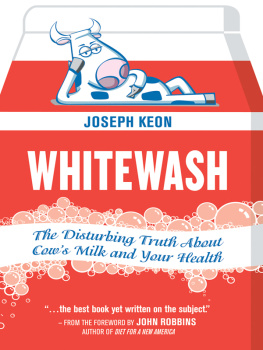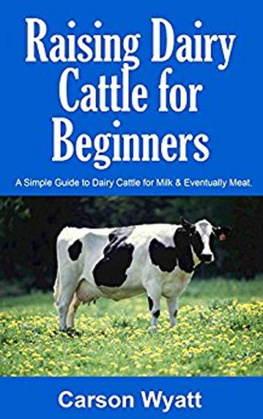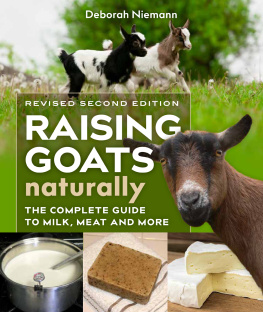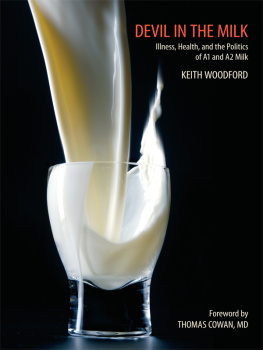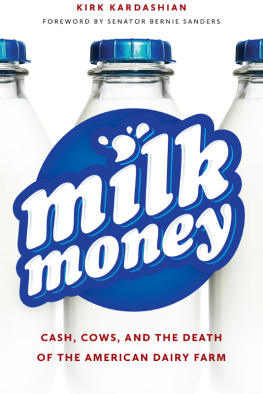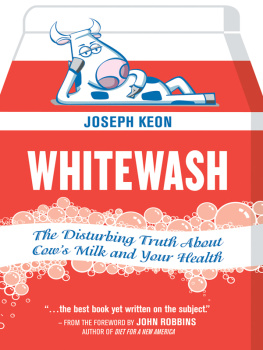All truth goes through three stages.
First it is ridiculed.
Then it is violently opposed.
Finally, it is accepted as self-evident
Arthur Schopenhauer, German philosopher
For every human problem there is an answer
that is simple, neat, and wrong.
H.L. Mencken
I sat in the studio of a radio station in northern California, facing the host of a politically progressive health talk show. Roughly two minutes remained before we went live on air. I had been invited on the show to talk about my first book, Whole Health: The Guide to Wellness of Body andMind. While putting on her headphones, with the red hand of the studio clock approaching thirty seconds till show time, the host paused and looked at me.
Oh, lets not talk dairy issues today, she said. Theres a lot more we can talk about.
Puzzled, I nodded weakly, trying to understand her last-minute directive. In our previous telephone conversation, she had expressed enthusiasm for my recently published article on health problems associated with cows milk. We had spoken in depth about the topic. Now she had derailed a trainload of important information I had planned to share with listeners. As she raised her hand to visually count down the last five seconds, I decided I had better abide by her request.
When the show was over, I asked her why she had changed her mind about discussing cows milk. The radio station, she explained, was located in the heart of a dairy-producing community, and she hadnt wished to offend her listeners. On my way to the parking lot, while reading a promotional pamphlet I had taken from the station on my way out, I discovered another possible motivation. The health programs primary sponsor was none other than a local dairy producer.
Unfortunately, such information-squelching occurs with great frequency, and not only to guests on radio talk shows. Despite our First Amendment right to freedom of speech, our corporate-owned media increasingly discourages people from speaking candidly on issues that might antagonize a variety of special interests. Some states even have food disparagement laws also known as veggie libel laws to prevent people from criticizing particular food commodities. Such laws were inspired in part by former president George Bush Sr.s public confession that he hated broccoli, which sent broccoli sales plummeting.
Uninformed, Misinformed, and Generally Confused
Commodities and corporations dont need civil rights. But people do, especially where their health and well-being are concerned. Essential information about the products we purchase and the foods we eat should be openly available to all. Yet too often we are misinformed, or crucial health and product information is withheld from us, for purely economic reasons. A key problem is a complicit media that allows advertisers and corporate sponsors to virtually legislate content for financial reasons that override public health considerations. What magazine, radio or TV network wants to offend a company that pays them thousands or even millions of dollars a month to advertise its products? My radio experience is a small example of a pervasive problem.
More than ever before, reliable information about the food we eat is essential to our health. Many foods today contain industrial contaminants, pesticide and herbicide residues, preservatives, and other unhealthy ingredients. Our health increasingly depends upon knowing exactly what we are putting into our bodies. Without such information, how can we make informed decisions and healthy purchases? This simple concept of full disclosure and informed consumer consent is the inspiration for this book.
Most people want to live healthy and vital lives, and many adopt strategies and lifestyles they believe will protect and fortify their health. Yet most Americans are deeply confused as to what constitutes truly healthy nutrition. Sadly, much of the official information we are given is harmful to our health, the health of our children, and even the health of our planet. Where health matters are concerned, surveys continually point to the reality of an under- or mis-informed public. Most Americans today largely base their health choices on nutritional myths, the food industrys advertising propaganda, and the compromised nutritional guidelines of bureaucratic government agencies enmeshed with and corrupted by special-interest lobbies. This book shows the devastating impact of such misinformation on our health, and how comprehensively the federal government agencies appointed to protect us have failed to do so.
Even oversight agencies sworn to protect us protect the industries that put our health at risk instead. The Food and Drug Administration (FDA), the Environmental Protection Agency (EPA), and the Department of Health and Human Services (HHS), refuse to level with Americans about the contaminants we are exposed to every day through the foods we eat, and also refuse to prosecute criminally negligent corporations that contaminate our ecosystem and food supply. Such bias can reach ludicrous extremes. After the accident at the Three Mile Island nuclear reactor, government officials assured the local public that the exposure level was no greater than what one would receive from wearing a radium dial watch. One nuclear industry official publicly announced that plutonium was safe for human consumption and could be sprinkled on breakfast cereal and eaten without hazard. But when an anti-nuclear organization invited him to prove his claim by attending a plutonium breakfast, he declined to attend.
Unfortunately, when it comes to information, the popular health industry is almost as unreliable as the federal government. Month after month, year after year, countless magazines, books and articles and now websites and infomercials serve up new dietary rules, plans and theories guaranteed to dissolve fat and miraculously improve our health. Even major newsmagazines, TV and radio networks offer daily advice on exercise, weight control, cholesterol levels, heart care, and more. But much of this information is contradictory or unsupported by scientific studies. Most of it is market-driven geared to promote related programs, products, or services. Some of it is downright dangerous. And each approach is generally touted as the last, the best, the ultimate, or even the only diet you will ever need.
The contradictory health directives of countless nutritionists, physicians, health experts and gurus, credentialed and otherwise, only increase our confusion. Its no surprise that, just a few years ago, the authors of three bestselling diet books admitted to being overweight, with one approaching obesity, while a fourth, a cardiologist presenting the secrets of good nutrition, admitted to having heart disease for which he took prescription medications. No wonder so many of us feel bewildered and led astray on the road to wellness.
As the health of the average American is sacrificed to the profit motive, we are all put at increased risk of serious medical conditions like osteoporosis, high blood pressure, heart disease, obesity, cancer, and a host of others. Today more than ever, what we dont know can make us sick, and eventually kill us, even while we believe we are doing all the right things.
The Calcium Paradox
I wrote this book to try and explain why Americans, among the top consumers of calcium (largely by way of dairy products) in the world, also have one of the worlds highest rates of bone fracture. For over eighty years the milk industry, through relentless advertising and the cooperation of our public school systems and the medical professions, has hammered a myth into the collective American psyche: that cows milk is a healthy, calcium-rich food essential to building and maintaining strong bones and teeth. Surprisingly, our obsessive consumption of calcium derived from dairy products seems to be a detriment to our bones and our general health.
Next page
